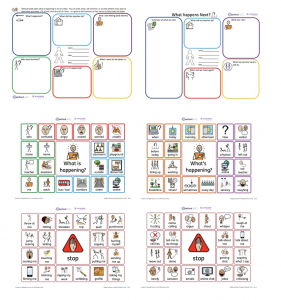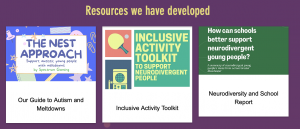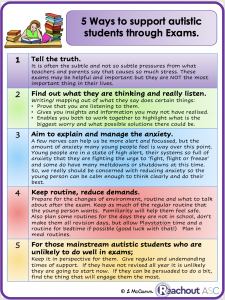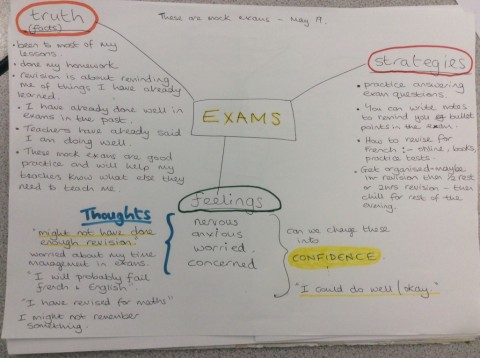New Collaborations for the Reachout ASC team
/in News articles /by Lynn McCannWe’ve been chatting to all kinds of people who share our passion for autistic young people, and we currently have projects on-going with:

Kidscape – Anti-bullying charity
Check out our autism communication mat, parents booklet and social stories that we have created with Kidscape, with Widgit.com symbols.

2. Spectrum Gaming
We have loved working alongside the gang at Spectrum Gaming to support the development of their resources. Take a look what they have produced with autistic young people:
https://www.spectrumgaming.net/advocacy
3. The PDA Society
Lynn has been on the Education Committee of the PDA Society and has contributed to these new PDA support leaflets now on the Twinkl website:
https://www.twinkl.co.uk/blog/teaching-learners-with-a-pda-profile
And there’s more to come in 2023!
Lego based therapy courses.
/in News articles /by Lynn McCannOur Lego Based Therapy Courses are now available online
We have developing an online version of our Lego Based Therapy training which works best be for 2 adults from the same setting. In the afternoon you would be working with 3 children in your school for 45 minutes. For full details (and you can still take part if you are unable to work with children) please email us. Look out for course dates on our UPCOMING TRAINING PAGE.
Welcome to our New Website
/in News articles /by Lynn McCannWelcome to our new website
Lockdown gave us some time to work on updating our website and bring to you an updated and more accessible look. Please do have a scout through our pages…
5 Ways to support Autistic Students through Exams
/3 Comments/in Blog post /by Lynn McCann Download here 5 ways to support exams
Download here 5 ways to support exams
It’s that time of year again. Emma and I have been spending some of last sessions with our autistic Y11 students, supporting them and their teachers through these next few weeks as the GCSE exams loom.
We thought it may be a good time share some of the wisdom we have learned along the way. Here’s 5 top tips to help you if you are a teacher or parent supporting a young person through this time. Whatever it is they may or may not achieve, it’s just one part of education…and after years of doing this, many of them do just fine…
1. Tell the truth
It is often the subtle and not so subtle pressures from what teachers and parents say that causes so much stress.
We do tell young people that these exams are the most important thing in their life.
Parents pick up on this false importance and put pressure on their child. There’s pressure from assemblies, media and young people passing these messages between them. Teachers have been put under so much pressure. Exam results are what gives the school its status and many are in fear of their jobs if students don’t achieve expected grades. That pressure is naturally put onto young people and they are the ones who are supposed to ‘perform’ under that pressure.
Here are some truths:
- You will not die if you don’t do the exams.
- You will not be a failure in life if the results are not what you or your teachers were aiming for.
- You may do even better than you thought you might.
- Colleges reassess their pupils throughout the first few months so if you are put on an unsuitable course you can often change courses.
- GCSEs are a step onto the next thing. Most colleges want students to come so will find a course that you can do and are interested in for you.
- There are different ways to get a job in the area you are interested in. There are more kinds of jobs than you can ever imagine. Including being self-employed.
- English and maths are the most useful GCSEs to have. You can retake them when there is less pressure from so many other subjects. My autistic employee took her GCSE maths when she was 28 and is taking her GCSE English now she is 30. I met a young man and his mum today who I used to teach. He went to a special school and is now at college. He is about to sit his GCSE maths and English because he now is ready…he wasn’t at 16.
- Some people take longer to get where they are going. Life is NOT a race.
- Exam results are NOT a measure of your worth as a person.
Take off pressure, tell the truth. Yes, tests and exams have a place in our education system but they ARE NOT THE END OF THE WORLD. They are helpful to get onto the next step, but there are many routes into the world of work and life so we have to stop putting the pressure on.
2. Find out what they are thinking and really listen
I am a big fan of mapping things out. I find that autistic young people (and many others) have so much going on in their brain and so many bits of ‘advice’ given to them verbally, that recalling any of it, especially when it is needed can be impossible. Others recall all of it but are too overwhelmed to use what they need and become very anxious to do EVERYTHING everyone said. Too much reliance on verbal language means the energy they need to process that is often much greater than it is for non-autistic students.
I sit with students and ask them to tell me what they are thinking, feeling, worried, confident, confused about. I write all this down on a large piece of paper. Often things come out that no-one realised they were bothered about such as “one teacher in year 10 said I wouldn’t get to university if I didn’t get an A in French” (this really happened).
The mapping out of what they say does certain things:
- Prove that you are listening to them.
- Gives you insights and information you may not have realised.
- Enables you both to work together to highlight what is the biggest worry and what possible solutions there could be.
For some students just getting it out and being listened to is enough. For others, simple solutions present themselves from what you see on your map. For others, they may need extra support, changes and help to get them where they need to be. Often, we use the same piece of paper (leave space for this) to add some perspective. So, if you know they think they are going to fail, then you can remind them that they have attended all their lessons, done okay in previous exams, or whatever facts you can give to help them get that particular worry into perspective.
3. Aim to explain and manage the anxiety
A few nerves can help us be more alert and focussed, but the amount of anxiety many young people feel is way over this point. Young people are in a state of high alert, their systems so full of anxiety that they are fighting the urge to ‘fight, flight or freeze’ and some do have many meltdowns or shutdowns at this time. So, we really should be concerned with reducing anxiety so the young person can be calm enough to think clearly and do their best.
Many autistic students we support are very anxious at this time of year, not only because they are going to have to try and remember information for an exam, but they don’t know which information they need to remember, can’t predict or prepare for what the actual questions will be and so many other things are going to change around the exams (and probably already have).
Perfectionism
Here’s a handy video from Pooky Knightsmith. The rigid thinking and beliefs that nothing but a perfect score will do, and therefore they cannot do the exams because they might not get that perfect score, is very disabling when a student goes through this. It takes kindness and coaching to support them through it – and please don’t nag them or keep repeating ‘it doesn’t matter’ because their feelings are huge and they do matter to them. Taking the situation one aspect at a time, looking at the facts (for example the exam boards websites) and breaking the revision and tasks into smaller chunks might help. Some children are very distressed by perfectionism and they need less pressure because they can use the pressure you give them (you will call it encouragement) to blame you for their distress. Backing off, giving them options (even not to do the exams at all) often allows them thinking time and opportunity to try to do the exams. Perfectionists are usually very bright and will do well if they can get to do the exams and will need support to have time off revision and to get out into the fresh air or switch off from studying.
Sensory Needs
There will be sensory differences, a completely different timetable, familiar routines will change. Prepare the young person for this, and make sure familiar things are highlighted. This is a good time to write lists, use a calendar, or even return to using a visual timetable. Show what is familiar and add times of relaxation, sensory comforts and rest. Talk to your young person, tell them the most important things are that they can get through this, it is temporary and that eating, drinking and resting are the priorities (even over revision if that is a huge stressor as it is in many of our pupils). Make those sensory adjustments (a quiet room, sitting at the back or whatever will help them and make sure the invigilators know about those adjustments).
Take away the pressure
I often tell parents to take ALL pressure away and even act like they don’t mind how the young person does in the exams. For many autistic young people, the pressure is from within themselves, and their teachers, so a home which reduces the pressure is so helpful for them. Be careful to acknowledge your own worries and anxiety. Much of what you worry about is catastrophising too, banish the negative what ifs from your own mind. Start to look for opportunities rather than only seeing the barriers.
Affirm them
For some students we will make affirmation key rings to remind ourselves of these truths. You can make your own depending on what would help, or these from GoZen are good too. https://gozen.com/40-affirmations-to-bust-test-anxiety-rooted-in-science/
Exam concessions
Many autistic students are eligible for exam concessions and this will need to be discussed as early as possible. The school will probably want to do some assessments and there are a lot of adaptations that can be made such as sitting in a quiet room, having more time, having sensory or movement breaks and even listening to music (as long as the playlist is pre-approved). Here’s a handy booklet to explain it to your autistic young person Exam Access Arrangements
Document about exam concessions for schools
4. Keep routine, reduce demands
Prepare for the changes of environment, routine and what to talk about after the exam. One of my students was very anxious about having two exams in one day, but the biggest stress was whether he’d have enough time to have his lunch in between. The hall for exams was at the other end of the school from the dining area, so we found another quiet area, nearer to the hall which would have given him time and space to eat without being worried by more than he needed to worry about.
The biggest thing to help is reminded you young person what has finished. If necessary, write the exams on post it notes and take them OFF the calendar when they are finished. Or just put a big green tick through the date. It is done, finished.
Keep your routines
Keep as much of the regular routine that the young person wants. Familiarity will help them feel safe. Also plan some routines for the days they are not in school, don’t make them all revision days, but allow Playstation time and a routine for bedtime if possible (good luck with that!) Plan in meal routines.
What cones next?
Think of projects they might be interested in for the summer break. This will depend on your young person and their capacity to engage after the exams. Give them time to rest too. One family sat with their autistic young person and put a list of things they’d like to do and put them on post-it notes as a choice board. The young person could choose one a week, then put it back on the board in case they wanted to do it again. They ended up doing the same thing every week for the whole summer, but it was really successful in keeping them engaged and structured ready for college in the September.
If they do not want to go over it in any detail, or at all, then let it go. If they do, listen and then remind them it is finished. Help them to move on to thinking about the next thing. Make sure they have assured ‘down time’ or activity time after the exam, what they have chosen to do. Some might like to bounce on the trampoline, others need to hide under the duvet. Let them recover in their own way and if there is no need for them to stay at school, let them go home straight after the exam.
5. For those mainstream autistic students who are unlikely to do well in exams
Keep it in perspective for them. Give regular and undemanding times of support. If they have not revised all year it is unlikely they are going to start now. If they can be persuaded to do a bit, find the thing that will engage them the most, such as an App or computer based activity.
For some it is about the clear distinction between school and home, full stop, or just that school takes up all their spoons (see spoon theory here) and they just CAN’T. Putting more pressure on at this time of the year is likely to have the opposite effect you have desired. Bribery rarely works (although some negotiation for a treat afterwards works for some, I’m not a fan of it, it is often just more pressure to perform, I’d rather give the treat just for being them!) They may do much better than you think and be able to move on to the next steps. We have done a lot of work by now with our Y11 autistic students who are not good at exams. We have made plans, found out what they might do that they are interested in and applied for college, already the transition for college has begun and most of them, despite what the GSCEs will result in, have a Plan A, B, C or whatever they need. It’s not too late to discuss the possibilities for the future, charities do support young people with disabilities into employment in some areas. Find out what there is and have it to hand for when your young person is ready to listen.
It’s not the end of the world
Go over the truths at the beginning of this post and remind your student that this is NOT the end of the world. There are too many autistic young people giving up on education and feeling hopeless about life at this stage because all our systems tell them they are failures. I can’t bear it.
Let them rest and recover over the summer. Let them do what they like and emotionally recover from the trauma that school may have caused them. I cannot tell you how to get a 16 year old autistic young person out of their bedroom and into gainful employment, you have to let them recover and work from what they DO like, what they are good at. Even if all they do is play games online. Go into their world and start from there. Have some non-negotiables, like being safe, eating meals or whatever you can manage. You may be able to get help, you may have to find help and advice yourself, but no autistic young person is a failure and there can be a place for them in this society.
Get help
I wish I could do more about this because it is such a hard time for parents, but my best advice is to get online and start to talk to the autistic community. Find autistic adults who have worked in advocacy and advice or training and ask what they suggest. They have probably been through something similar and they are the best people to help and advice you for your young person.
And from now to August when the results come out – remember to allow you and your child to BREATHE!
5 ways to support exams (download the poster)
Here’s a link to the ideas to help the transition to college / FE

 Download here
Download here 
